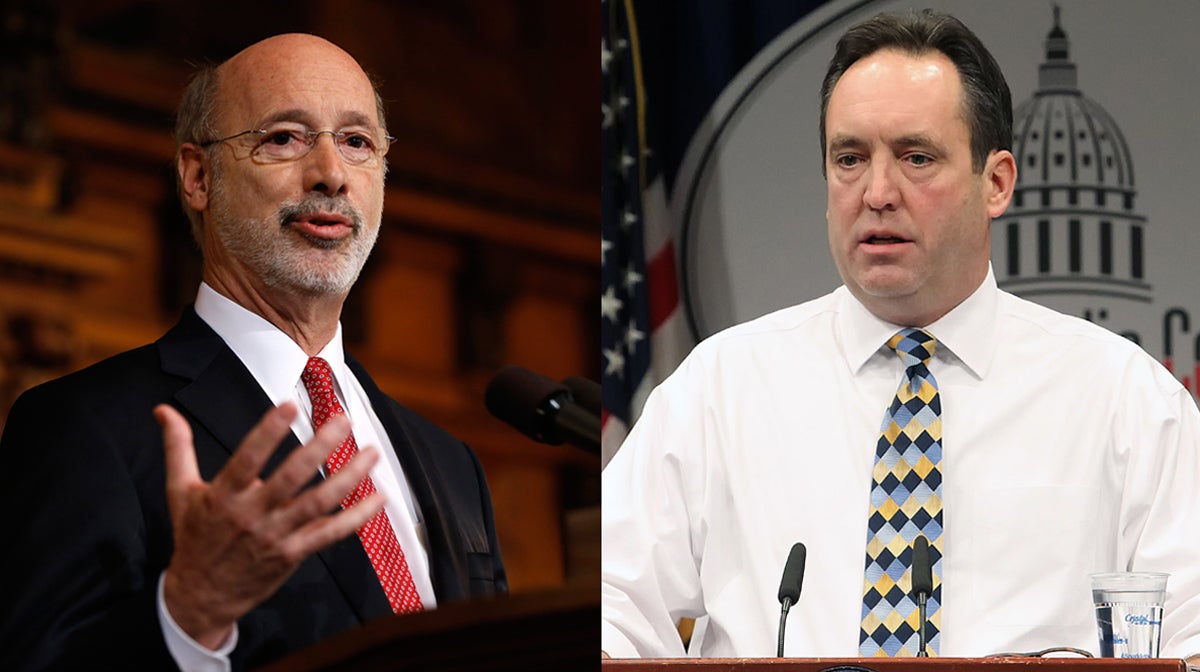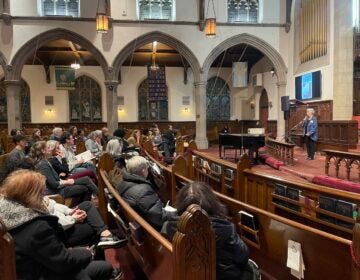Gov. Wolf pledges to veto bill that diminishes teacher seniority
Listen
Pennsylvania Governor Tom Wolf (left) and Senate Majority Leader Jake Corman (right) (AP Photos/Matt Rourke and Chris Knight)
The Pennsylvania school code says teacher layoff decisions can only be made according to who has the least seniority.
The Republican-held general assembly passed a bill this week to change that, but it’s facing a veto pledge from Governor Tom Wolf.
The bill does two main things. It changes the conditions under which layoffs can happen and it changes which teachers should be laid off.
It allows districts to make layoff decisions based on budget shortfalls. Right now they can only lay off teachers when enrollment drops, when whole academic programs are cut, or when schools consolidate.
Opponents of the status quo say this forces districts to make decisions more in the interest of teachers than students.
The bill also says that teachers rated as “failing” by the state’s new teacher evaluation framework should be the first let go if layoffs are needed.
Seniority would still be the law of the land among teachers with the top two ratings, “distinguished” and “proficient.”
“This is common sense,” said Senate Majority Leader Jake Corman, R-Centre. “Right now it’s strictly seniority. And so whether you’re the best teacher or not, seniority dictates who stays and who goes. It’s last in, first out.”
The bill passed the Senate this week with the support of most Republicans. Nearly all Democrats opposed it. It passed the House last summer with a similar dynamic.
Governor Wolf has promised a veto, saying he supports seniority protections.
“I think, on the whole, it’s a fair and just way to look at education,” Wolf said. “I think teachers want to do a good job, and I think they want to be treated fairly. And I think if they’re treated fairly, they treat their students and the communities they serve fairly.”
Bill sponsors Rep. Stephen Bloom, R-Cumberland, and Sen. Ryan Aument, R-Lancaster, are holding a rally in the capitol Thursday morning in hopes of changing Wolf’s mind.
Resources, not layoffs
The state’s largest teachers union, the Pennsylvania State Educators Association says the real focus should be on giving schools the resources they need to prevent layoffs from happening in the first place.
Between 2010 and 2014, the state shed more than 20,000 jobs in public education.
“This is the last thing Pennsylvania needs right now,” said PSEA spokesman Wythe Keever. “The general assembly ought to be talking about how to invest in education.”
According to the bill, layoff decisions must be based on teacher evaluations without considering salaries, and districts seeking to downsize must also lay off an equal percentage of administrative staff, unless given a special waiver from the state.
House GOP spokesman Steven Miskin links Wolf’s opposition to the bill to his close relations with groups like PSEA.
“Who is he really supporting? Is he supporting the kids and the best teachers possible? Or is he supporting really the unions, his union backers? It’s a question,” said Miskin.
The Wolf administration pushed back on that rationale. It argues that districts already have the tools to remove ineffective teachers from classrooms, and says the state should not interfere with local staffing decisions — especially based on what it sees as a flawed teacher evaluation metric.
Some proponents of the bill also have major concerns.
“There are valid concerns about using that measure as the means to determine who should be furloughed,” said Jim Buckheit, executive director of the Pennsylvania Association of School Administrators.
Thirty percent of a teacher’s rating is now based on student performance on state standardized tests — half of which relies on how well all students in a school perform on english, math and science tests.
In this system, effective teachers in poor performing schools can look bad, while lesser teachers in better performing schools can seem great. And that part of the metric doesn’t provide much meaningful insight into the quality of educators who teach other subjects.
In addition to these criticisms, Buckheit believes the metric actually makes it too easy for teachers to avoid poor ratings. Before the new evaluation metric was added, 97.7 percent of the state’s teachers were rated satisfactory. Since the new system was implemented, that percentage has risen.
“It’s a terribly flawed system that needs to be corrected and is caught up in the politics in Harrisburg right now,” he said.
Half of a teacher’s rating comes from administrator observation. The remaining 20 percent comes from student achievement on assessments other than state tests.
Earlier this year, the legislature and governor came to consensus on a bill that postpones a standardized testing requirement for high school graduation.
In concert, the two bills make teachers more accountable for test results while taking consequences away from students.
Funding boost
In the larger political dynamic, additional education funding often flows from Harrisburg with strings attached. And, even if Wolf moves forward with the veto, GOP leaders say this bill is the sort of accountability measure the governor will have to swallow to get a funding boost in this year’s budget.
“If we’re going to put more money into school districts, we want to make sure that it’s used to the best interests of the students,” said Corman.
Herein lies the catch-22.
Without raising additional funds for schools, education advocates like Buckheit fear districts will again be forced to consider downsizing — a decision that will be driven in large part by ballooning pension obligations.
In December, Wolf and legislative leaders reached a deal that would have delivered schools a major boost while also reforming the state employee pension system to reduce market risk on taxpayers and school districts. It died in the House without support from rank-and-file lawmakers.
Correction: A previous version of this article said that all democratic senators opposed the bill. On final passage, Anthony Hardy Williams, D, Philadelphia, voted for it.
WHYY is your source for fact-based, in-depth journalism and information. As a nonprofit organization, we rely on financial support from readers like you. Please give today.






